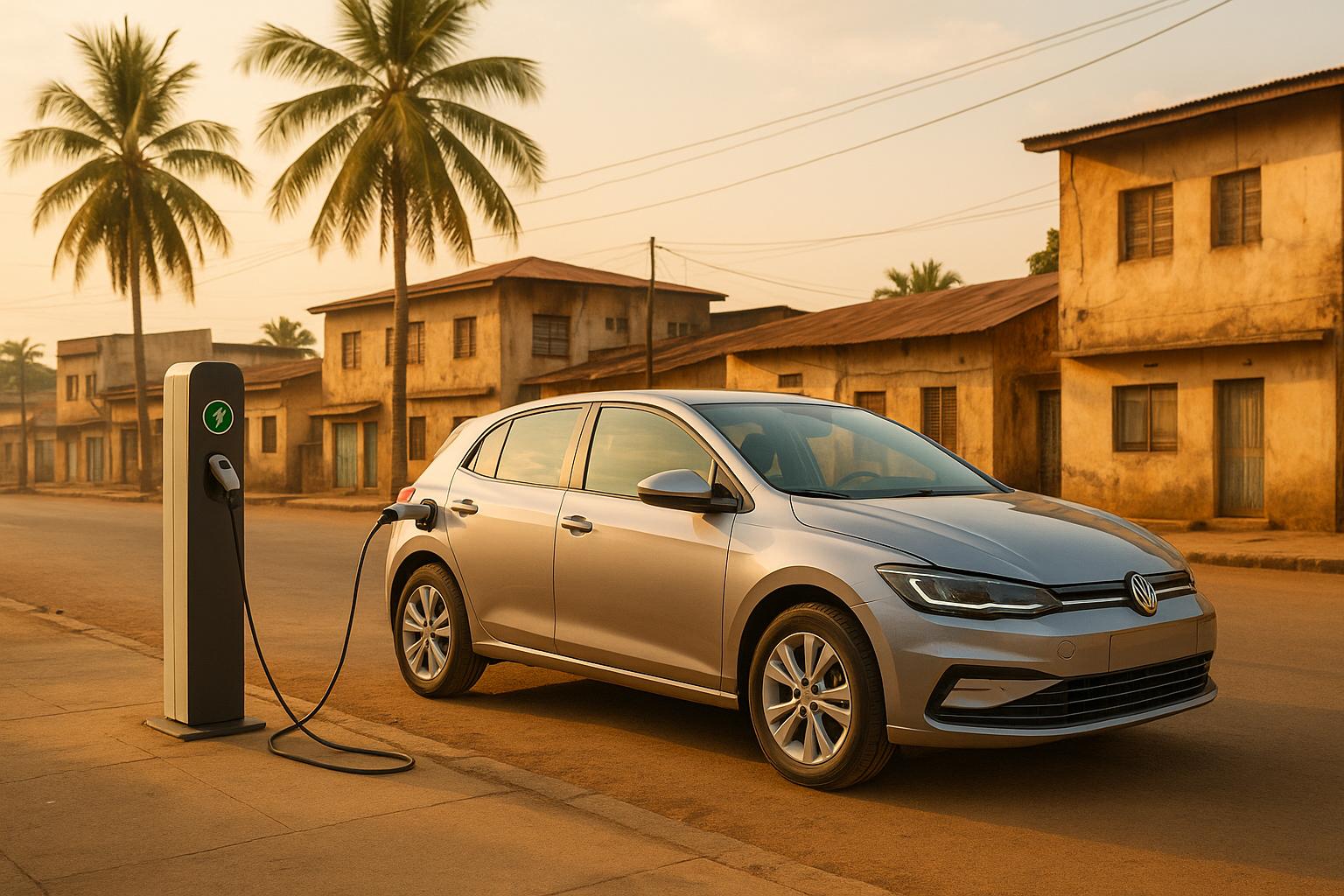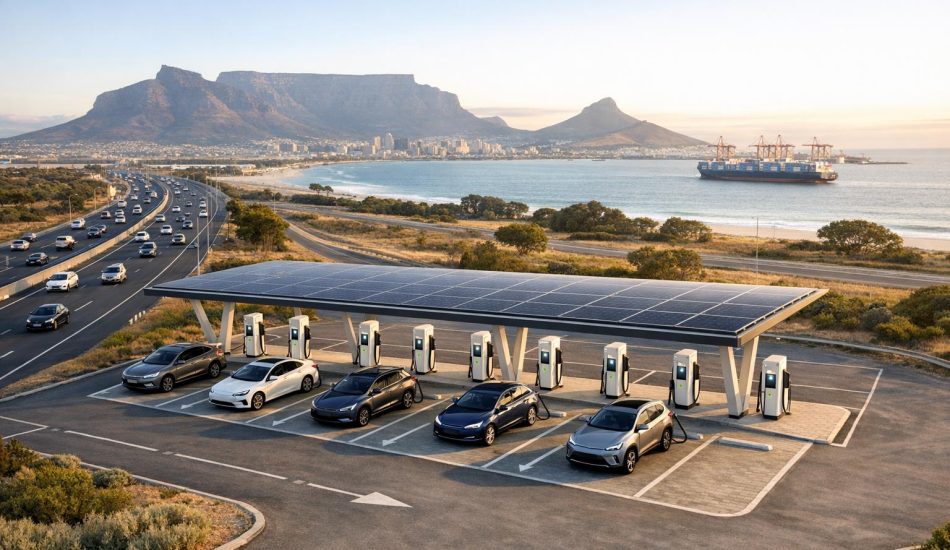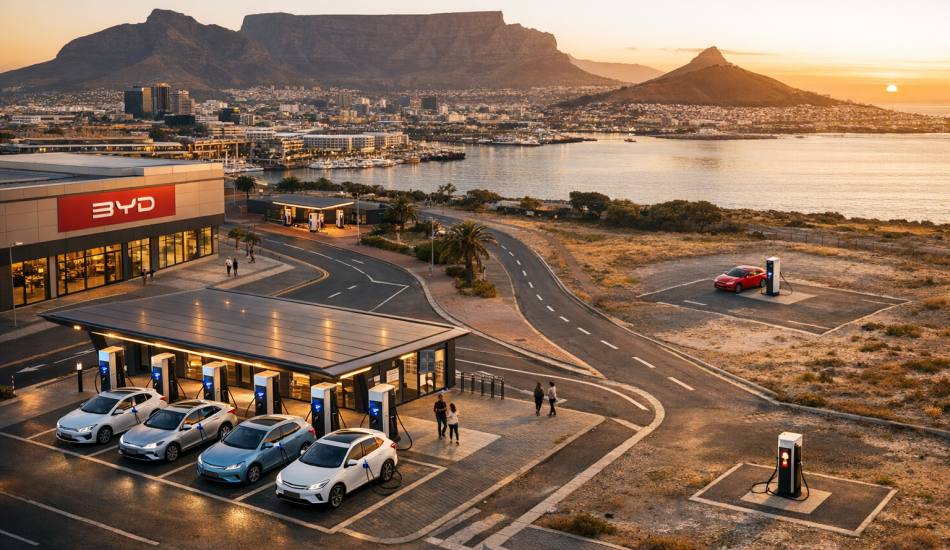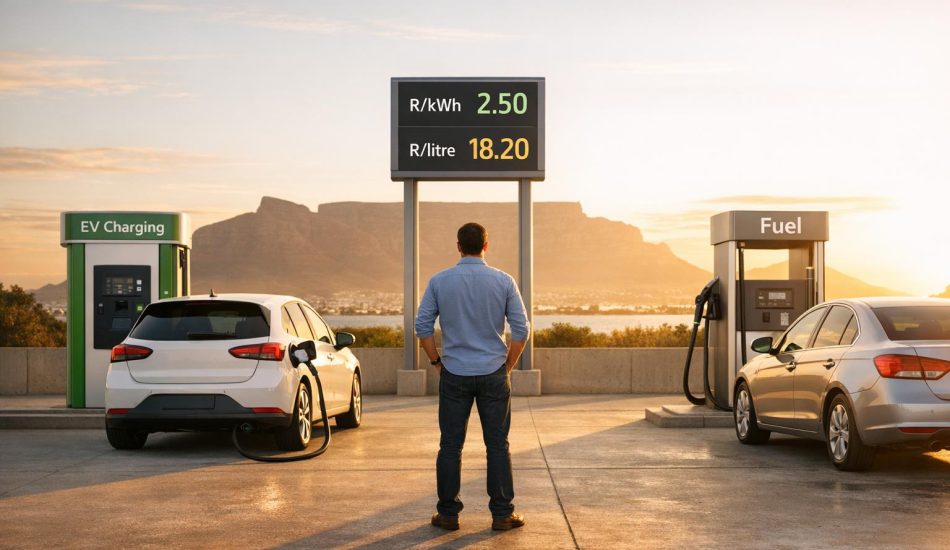
Electric vehicles (EVs) in Nigeria offer a mix of advantages and challenges. They can save you money on fuel, reduce maintenance costs, and improve air quality in cities. However, limited charging stations, unreliable electricity, and high upfront costs make EV ownership less convenient for many. Here’s a quick breakdown:
- Advantages:
- Fuel Savings: Charging is cheaper than buying gasoline, especially during fuel shortages.
- Lower Maintenance: EVs have fewer parts, reducing repair needs.
- Cleaner Air: No emissions, improving urban air quality.
- Growing Options: Models like Tesla, Hyundai Kona, and local brands like Innoson are available.
- Challenges:
- Charging Infrastructure: Few public stations, mostly in cities like Lagos and Abuja.
- Electricity Issues: Power outages complicate home charging.
- High Costs: Expensive upfront prices due to import duties and taxes.
- Market Hesitancy: Concerns about resale value, road durability, and technician availability.
Solutions like government incentives, solar charging systems, and expanding charging networks are slowly addressing these barriers. If you’re an urban driver with access to reliable charging, an EV might be a good fit. But for long-distance travelers or those in areas with poor infrastructure, waiting for improvements could be wiser.
Exploring the Potential of Electric Vehicles in Nigeria
Benefits of Owning an Electric Car in Nigeria
Electric vehicles (EVs) are gaining traction in Nigeria, offering a mix of cost savings, cleaner air, and simplified maintenance for drivers.
Fuel Cost Savings
One of the most immediate perks of owning an EV in Nigeria is the savings on fuel. Charging an electric car costs between ₦9–₦16 per kilometer, compared to the steep ₦577–₦700 per liter for gasoline. For example, fully charging a 42 kWh battery – giving you about 267 miles of range – costs roughly ₦9,450 (around $10.50) using Band A electricity rates. This becomes particularly valuable during fuel shortages, where EV owners enjoy stable and predictable charging costs. These savings, paired with the environmental benefits, make EVs an appealing option.
Climate Benefits
Electric cars have zero tailpipe emissions, which is a game changer for air quality in Nigeria’s bustling cities. This aligns with government efforts like Abia State’s initiative toward net-zero emissions. According to the Abia State Commissioner for Transportation, EVs are a smarter choice for sustainable transportation, helping to eliminate harmful pollutants such as nitrogen oxides and particulate matter. These pollutants are often linked to respiratory issues and other health problems, especially in urban areas.
Lower Maintenance Costs
Electric vehicles also lighten the financial burden of car maintenance. With no oil changes, no spark plugs, and fewer moving parts overall, EVs reduce the need for frequent service visits. This is a major advantage in Nigeria, where quality auto services can be both costly and time-consuming.
Available EV Models in Nigeria
The range of EVs in Nigeria is steadily expanding, offering drivers more options to suit their needs. Popular models include the Tesla Model S (up to 412 miles per charge, starting at about ₦38 million), the BMW i3 (approximately ₦30 million), the Hyundai Kona, and various models from BYD. Locally manufactured options, like those from Innoson, are also entering the market. Platforms such as EV24.africa make it easier for buyers to explore new and used EVs from top brands, complete with transparent pricing and delivery services.
The Nigerian government is also taking steps to encourage EV adoption. The Senate is working on legislation to require every fuel station to install EV charging points, signaling a push to make Nigeria a leader in electric mobility. Proposed incentives, including tax holidays, import duty waivers, toll exemptions, and subsidies, aim to make EV ownership more affordable.
Challenges of Owning an Electric Car in Nigeria
Owning an electric vehicle (EV) in Nigeria comes with a unique set of challenges. From infrastructure gaps to market hesitancy, these obstacles make the road to widespread EV adoption a bumpy one. Here’s a closer look at the key issues Nigerian EV owners face.
Limited Charging Infrastructure
One of the biggest hurdles is the lack of a widespread charging network. Public charging stations are mostly found in major cities like Lagos and Abuja, leaving drivers in smaller towns or rural areas with limited options. This scarcity means EV owners often rely on home charging, which isn’t always practical for longer trips. Fast-charging stations are rare, adding another layer of inconvenience. While some private companies are starting to install charging stations in commercial hubs, the overall network is still in its infancy. Expanding this infrastructure is essential for making EVs a viable choice for more Nigerians.
Unreliable Electricity Supply
Nigeria’s erratic power supply is another major concern. Frequent outages can disrupt home charging, leaving EV owners scrambling for alternatives. Many have turned to solar panels or battery backup systems to ensure they can charge their vehicles, but these solutions come with additional costs and logistical challenges.
High Purchase Costs
Electric vehicles remain prohibitively expensive for most Nigerians. Import duties, taxes, and shipping costs significantly drive up prices, as most EVs are brought into the country rather than assembled locally. Without meaningful government incentives to offset these costs, EV ownership remains out of reach for many. The lack of affordable options further slows adoption.
Market Acceptance Issues
Even beyond the practical barriers, there’s a level of skepticism about EVs in the Nigerian market. Potential buyers worry about resale value, how well EVs can handle Nigeria’s harsh road conditions, and the availability of qualified technicians for maintenance. Insurance practices for EVs are also still evolving, adding to the uncertainty for prospective owners.
sbb-itb-99e19e3
Solutions for EV Ownership Challenges in Nigeria
Electric vehicle (EV) ownership in Nigeria comes with its fair share of challenges, but there are practical ways to address these issues. By focusing on infrastructure, financial hurdles, and power supply concerns, innovative solutions are paving the way for a more EV-friendly environment.
Home and Solar Charging Options
For Nigerian EV owners, installing a home charging station can provide a dependable way to keep their vehicles powered. A Level 2 charging unit, which typically costs between ₦500,000 and ₦1.5 million ($650–$2,000), can be installed within 1–2 weeks. The process involves evaluating your home’s electrical setup, obtaining necessary permits, and working with certified professionals to ensure compliance with local electrical standards.
Solar-powered charging offers an even more sustainable option. A fully equipped solar charging system, complete with battery backup, costs between ₦2 million and ₦5 million ($2,500–$6,500). This approach not only addresses frequent power outages but also cuts down on long-term energy expenses. For instance, Foltï Technologies made headlines in 2025 by launching Nigeria’s first solar-powered ride-hailing platform, showcasing how solar energy can support both personal and commercial EV use. These systems typically include solar panels, battery storage, and compatible charging equipment.
Government Incentives and Financing Solutions
The Electric Vehicle Transition and Green Mobility Bill is a game-changer for EV adoption in Nigeria. It offers several financial benefits, including tax breaks, import duty exemptions, toll waivers, and direct subsidies for both EV buyers and investors. The bill also requires every fuel station in Nigeria to install EV charging points, which could significantly expand the country’s charging infrastructure.
Private investors are encouraged to develop charging networks through government grants and tax credits, while foreign automakers are mandated to collaborate with local assemblers and source at least 30% of their components locally by 2030. This not only supports job creation but also has the potential to lower EV costs through local production.
To ease the financial burden on buyers, companies like EV24.africa provide flexible payment options, including installment plans, lease-to-own programs, and partnerships with local banks. In 2025, a Nigerian EV startup introduced free charging stations in six locations, along with flexible financing options and an EV learning center in Lagos to educate and empower local users. These initiatives are helping to bridge financial gaps while addressing charging infrastructure challenges.
Planning Around Infrastructure Limitations
Given the current limitations of Nigeria’s charging network, EV owners need to plan their routes carefully. Using mobile apps to locate charging stations and mapping out travel routes in advance can reduce the risk of running out of battery. For longer trips, scheduling stops at known charging points and avoiding areas with unreliable power supply can help ease range anxiety.
By 2025, NEV Electric had installed 300 charging stations in Lagos and Abuja, including solar-powered options, creating more dependable routes for intercity travel. Community-based efforts are also gaining traction. For example, Lagos State’s Lagride program added 100 EVs to its fleet and introduced shared charging stations for drivers. Similarly, Abia State is working on a network of charging points to support its public transport electrification plans.
These community hubs allow residents to pool resources for setting up and maintaining charging infrastructure. Local EV associations and online forums play a key role in coordinating these efforts, sharing updates on new charging locations, government policies, and infrastructure developments. Additionally, the National Automotive Design and Development Council (NADDC) trained over 10,000 workers in EV-related skills by 2025, ensuring that technical support is readily available for both individual and community projects.
Staying informed about policy changes and industry developments – through government announcements, news outlets, and EV-focused communities – can help buyers make well-timed decisions to take full advantage of available incentives.
Pros and Cons Comparison Table
Here’s a quick overview of the main benefits and challenges of owning an electric car in Nigeria:
| Category | Benefit/Drawback | Explanation | Practical Impact in Nigeria |
|---|---|---|---|
| PROS | |||
| Financial | Fuel Cost Savings | Saves money on fuel expenses. | Helps lower transportation costs, especially with fluctuating fuel prices. |
| Environmental | Climate Benefits | No tailpipe emissions, reducing carbon footprint. | Leads to cleaner air, particularly in crowded cities. |
| Maintenance | Lower Maintenance Costs | Fewer parts mean less frequent repairs. | Reduces long-term ownership expenses. |
| Market | Growing Model Availability | More electric vehicle (EV) options are becoming available. | Builds consumer confidence and improves affordability. |
| CONS | |||
| Infrastructure | Limited Charging Network | Charging stations are mainly in major cities. | Long-distance travel requires extra planning. |
| Power Supply | Unreliable Electricity | Frequent outages disrupt home charging. | Backup charging solutions may be necessary. |
| Financial | High Purchase Costs | EVs cost more upfront than traditional cars. | Makes them less accessible for middle-income buyers. |
| Social | Market Acceptance Issues | Limited awareness and performance concerns. | Slows adoption until familiarity improves. |
| SOLUTIONS | |||
| Home Charging | Solar-Powered Systems | Off-grid charging option but requires a large initial investment. | Offers energy independence in areas with unreliable power. |
| Government Support | Policy Incentives | Policies that reduce overall costs. | Makes EVs more appealing and affordable. |
| Infrastructure Development | Expanding Network | Growing public and private charging infrastructure. | Increases the practicality of EVs for daily use. |
This table highlights the critical factors to consider when evaluating electric vehicles in Nigeria. For urban commuters with predictable routes, EVs can be a practical choice. However, frequent long-distance travelers may need to plan around the current infrastructure gaps until improvements are made.
Conclusion: Making an Informed Decision
Electric vehicles (EVs) present a mix of advantages and considerations. They promise fuel savings, low maintenance costs, and a noticeable reduction in urban air pollution. Early adopters in cities like Lagos, Abuja, and Port Harcourt have already shown that EVs can handle supported daily commutes effectively.
However, challenges like limited charging infrastructure, an inconsistent power supply, and upfront costs ranging from $5,880 to $34,700 remain significant hurdles. Deciding whether an EV is right for you means looking closely at your driving habits, financial flexibility, and access to reliable charging options.
On the brighter side, government policies are beginning to pave the way for broader EV adoption. Initiatives such as tax breaks, duty waivers, mandated charging stations, and ambitious plans for 12,000 electric buses, along with a local components requirement of 30% by 2030, signal a shift toward a more EV-friendly future.
For those ready to take the plunge, EV24.africa offers a user-friendly experience with transparent pricing, a wide selection of models, and assistance with import, customs, and registration processes – all accessible through WhatsApp.
When choosing an EV, think about how it fits into your lifestyle. If you’re an urban commuter with access to home charging, now might be the perfect time to make the switch. For long-distance travelers, waiting for a more robust charging network could be the smarter move. Keep an eye on growing incentives and infrastructure improvements as Nigeria’s EV market continues to evolve.
FAQs
What is the Nigerian government doing to improve electric vehicle charging infrastructure?
The Nigerian government has taken significant steps to improve the country’s electric vehicle (EV) charging infrastructure. In 2023, it rolled out the National Electric Vehicle Policy, designed to boost EV adoption and expand the network of charging stations across the nation. This policy offers incentives for both manufacturers and buyers, alongside plans to install charging stations in urban hubs and rural communities alike.
Backing these initiatives, the government has allocated around $1.5 billion to build EV infrastructure, with a focus on establishing charging stations in key cities. These measures aim to make EV ownership more convenient and accessible for Nigerians, while also advancing the shift toward cleaner energy alternatives.
How can electric car owners in Nigeria manage charging challenges caused by unreliable electricity?
Electric car owners in Nigeria face unique challenges due to the country’s inconsistent electricity supply, but there are practical ways to work around this issue. One option is to consider solar-powered charging stations or set up a home charging system equipped with energy storage solutions, such as battery systems. These setups can provide a reliable way to charge your vehicle, even when the power grid is down.
Another strategy is to plan your charging times during periods when electricity is more stable. It’s also a good idea to locate nearby charging stations that come with backup power systems to avoid interruptions. By adopting energy solutions designed to handle Nigeria’s electricity constraints, owning and operating an electric car can become a much smoother experience.
Are there any financial incentives in Nigeria to help reduce the high upfront cost of electric vehicles?
Currently, Nigeria lacks extensive financial incentives specifically aimed at encouraging the purchase of electric vehicles (EVs). However, there are some indirect measures in place, such as reduced import duties on EVs compared to conventional gas-powered cars, which can make them a slightly more appealing option.
Although direct subsidies or tax credits are rare, prospective EV buyers in Nigeria can still find ways to save money. For instance, choosing locally available EV models might help lower costs. Additionally, the long-term savings on fuel and maintenance can help offset the higher upfront price, making EVs a more practical choice over time.




